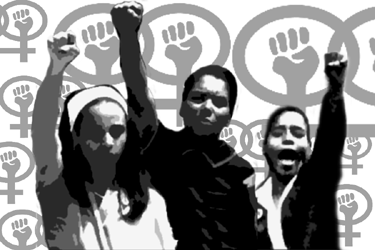The Washington Post’s She The People: Betty Friedan and Black Women: Is it time for a second look?

The Feminine Mystique by Betty Friedan published in 1963.
Betty Friedan’s “The Feminine Mystique” turned 50 this week. At the time of its publication, “Singletons” (circa 1963 defined as an unmarried woman) did not have a legal right to birth control. Married women did not have equal access to credit. In some states, married women could not get a job without the permission of their husbands. Occupational segregation was the norm. The wage gap was more like a wage canyon. Sexual harassment of women in the workplace was not yet legally actionable. Abortion was illegal. Every state in the nation required “fault-based” grounds for divorce. Spousal rape was not a crime in most states.
All of this changed for all American women in the wake of Friedan’s tome. Second wave feminism was born. The National Organization for Women was founded. The call for equality and women’s rights would resound in every cell of the American body politic.
All American women owe Friedan a debt of gratitude.
Yet, despite all of the above, as an African American woman, I can say that I have never met a black woman who admits to having read “The Feminine Mystique.” I have never heard a black woman of a certain age recite with the nostalgia what I refer to as “the Friedan anthem” – “The Problem with No Name.”
I have met, know, respect, and deeply admire countless white women of a certain stature and age who state that when they read the following words in Friedan’s book, they felt she was speaking to them and that they had been delivered:
The problem lay buried, unspoken, for many years in the minds of American women. It was a strange stirring, a sense of dissatisfaction, a yearning that women suffered in the middle of the twentieth century in the United States. Each suburban wife struggles with it alone. As she made the beds, shopped for groceries, matched slipcover material, ate peanut butter sandwiches with her children, chauffeured Cub Scouts and Brownies, lay beside her husband at night- she was afraid to ask even of herself the silent question –“Is this all?”
In a 2011 interview, Stephanie Coontz, author of “A Strange Stirring: The Feminine Mystique and American Women at the Dawn of the 1960s,” said that “One woman [she] interviewed, now a well-known academic, described reading the book and sobbing with relief, then finally getting up and flushing her tranquilizers down the drain.”
On the 50th anniversary of “The Feminine Mystique,” I can’t help but ask where are the voices of the millions of black and working class women who have fought against gender and race discrimination in celebrating Friedan. Why have we not seen a groundswell of black and working class women standing up to celebrate the many achievements in women’s liberty that were wrought as a result of Friedan’s work? And even more importantly, why is it that despite all of the battles that all American women have had to fight in order to share equally in the pursuit of the American dream with our testosterone-laden partners, so few black women call themselves feminists? Why is it that so few of us have had so little to do with second wave feminism?
Admittedly, I have not read “The Feminine Mystique.” As a college student, and even as law student who devoured books and law review articles about feminist legal theory and the status of women in the law for fun, I chose not to read it because I knew it did not include the lives of African American women.
I, like many of my African American classmates at that time, believed that by failing to include the lives of African American women, “The Feminine Mystique” could not possibly speak to the needs of African American women of our mothers’ generation, let alone our own.
Whether poverty-stricken, working class, middle class, or wealthy, many of the black women of my generation and that of our foremothers mistakenly believed that Friedan’s work spoke only to a privileged class of white women who had nothing better to do than whine about how difficult life was as a stay at home mother.
Married or not, many of our foremothers and many women of my generation were working class women for whom work outside of the home was a financial necessity. Married or not, many of our foremothers were middle class women who chose to work outside the home simply because they wished to do so. Married or not, there were, by any standard, wealthy African American women who made a decision to stay at home while others made a decision to work outside the home.
Yet for all of these black women, there were two major problems that had to be confronted — being black and being a woman at a time when there were virtually no meaningful legal protections against race or gender discrimination.
Coontz maintains that the omission of African American women in Friedan’s book was:
[A] glaring omission, all the sadder because Friedan herself had led fights against segregated housing. Some people have argued that black women would have loved to be homemakers, and that’s the weakness in Friedan’s defense of meaningful work for women. This is not the case, however. Yes, many black wives and mothers had to work, and at jobs that were truly horrible. But the upper middle-class wives and mothers who were least likely to have to work for financial necessity were already long before this was also true of white women the most likely to work, suggesting that something more than dire necessity was involved. And black leaders of both sexes had a long tradition of supporting women’s roles as co-providers for their families and as activist leaders of the community. I argue that although Friedan’s discussion of work was indeed elitist, the biggest problem with her book’s neglect of black women is that she missed the chance to show her white middle-class audience that some women were able to combine their identities as wives, mothers, family co-providers, and activists with interests beyond the home.”
I would argue that Friedan’s exclusion of the lives of black women in “The Feminine Mystique” unintentionally set us down a path that divided us as sisters. Fifty years later, many of those who were excluded from this book of such monumental importance would not feel comfortable calling themselves feminists. Despite our disdain for all forms of discrimination, we were not sisters in the movement. We were on our own in fighting these battles. I am not sure it had to be this way.
 Blackfeminism.wordpress.com
Blackfeminism.wordpress.comWednesday, I participated in a discussion on NPR’s The Diane Rehm Show about the relevance today of “The Feminine Mystique” and the ongoing debate over gender equality at work and at home. A woman who identified herself as Friedan’s personal assistant until the day she died called in to the show. From her comments, one could infer that it was her opinion that Friedan didn’t intentionally exclude black women from her book. Whether unintentionally excluded or omitted from the book, the lives of African American women are not a part of “The Feminine Mystique”.
 Ain’t I A Woman: Black Women and Feminism by bell hooks.
Ain’t I A Woman: Black Women and Feminism by bell hooks.Today, I would argue that Friedan’s unintentional exclusion of African American women in “The Feminine Mystique” was in fact a gift because it might be what led to the development of a black feminist movement and scholarship in the area of black feminist thought.
So this week, this African American woman has changed her tune. I purchased my first copy of “The Feminine Mystique.” I am celebrating all the gifts that Friedan brought all American women. But while I celebrate Friedan, I also will celebrate bell hooks, author of “Talking Back: Thinking Feminist , Thinking Black” and “Ain’t I A Woman: Black Women and Feminism. ”
I am celebrating all of the women who fought the battles that have allowed women of my generation, black and white, to more fully realize the American Dream.
 Michelle D. Bernard is the president and CEO of the Bernard Center for Women, Politics & Public Policy. Follow her on Twitter @michellebernard.
Michelle D. Bernard is the president and CEO of the Bernard Center for Women, Politics & Public Policy. Follow her on Twitter @michellebernard.
http://www.washingtonpost.com/blogs/she-the-people/wp/2013/02/21/betty-friedan-and-black-women-is-it-time-for-a-second-look/?preview=true&preview_id=5486&preview_nonce=4b1d961825
